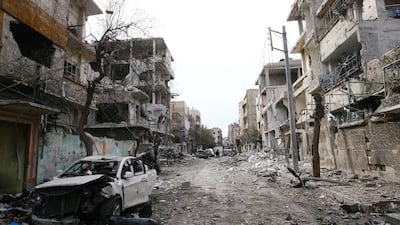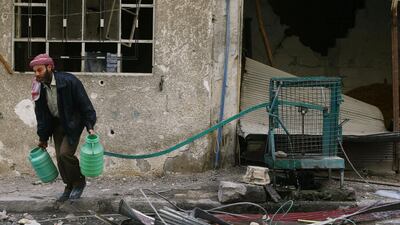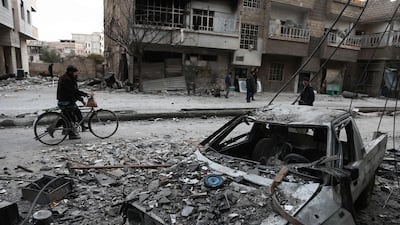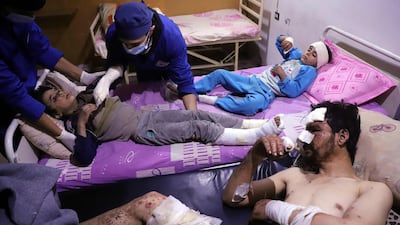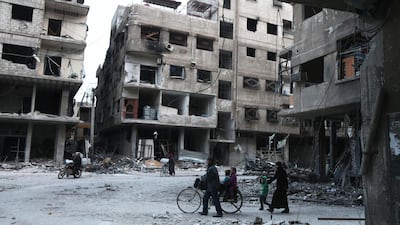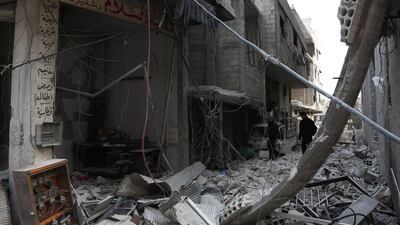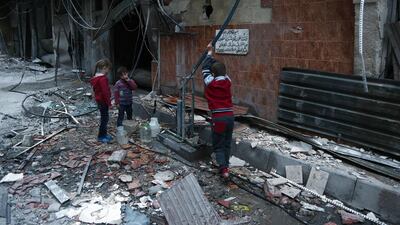A five-hour long "humanitarian pause" was ordered in Syria on Monday by President Vladimir Putin, Moscow's defence minister said.
"On the instructions of the Russian president, with the goal of avoiding civilian casualties in Eastern Ghouta, from February 27 - tomorrow - from 9.00 to 14.00 there will be a humanitarian pause," minister Sergei Shoigu said.
Ongoing airstrikes in eastern Ghouta, a group of Damascus suburbs, have killed more than 500 people in the last week, according to the Syrian Observatory for Human Rights. On Monday Syrian regime shelling killed nine members of the same family as its forces attempted to enter the capital's rebel-held suburbs.
Amid the continued fighting, United Nations secretary general Antonio Guterres had called earlier on Monday for the immediate implementation of a Security Council resolution for a 30-day ceasefire.
"Eastern Ghouta cannot wait. It is high time to stop this hell on earth," Mr Guterres said.
The UN passed the resolution on Saturday following the heaviest bombardment of the rebel enclave since the Syrian government’s forces first besieged it in 2013. The siege has cut off between 300,000 and 400,000 people and created an increasingly desperate humanitarian situation.
Eastern Ghouta is the last significant territory that rebels hold near the capital.
Regime ground forces encountered stiff resistance on Monday as they tried to push into the enclave, with rebel groups reportedly destroying government tanks and an armoured bulldozer.
The Russian government also denied on Monday that the Syrian government was responsible for an alleged chlorine gas attack in the area that killed a child and sickened others.
________________
Read more:
Child suffocates in Syria ‘chemical attack’
Syrian airstrikes pound Ghouta despite UN ceasefire resolution
_______________
The Syrian government, with Russian backing, agreed to a deal with the United States in 2013 to dismantle all of its chemical weapons after an alleged sarin gas attack that killed as many as 1,400 people in eastern Ghouta.
But the government has been accused of using chemical weapons, mostly chlorine, on dozens of occasions since then.
It is, however, the more “conventional” weapons that have caused most of the deaths in eastern Ghouta.
The Syrian and Russian governments have been accused of using cluster bombs in the heavily populated suburbs as well as fuel air bombs. Neither Russia nor Syria are among the 108 signatories of the Convention on Cluster Munitions, which bans the weapons.
The Russian government has also denied participating directly in the recent campaign of air and artillery strikes in eastern Ghouta. Moscow's intervention on behalf of the Syrian government, which began in 2015, has been instrumental in turning the tide in favour of president Bashar Al Assad.
Also on Monday, French President Emmanuel Macron told his Turkish counterpart Recep Tayyip Erdogan that the UN ceasefire resolution must be implemented in all of Syria, including the area around the northern city of Afrin.
Ankara last month launched an offensive against the Kurdish People's Protection Units (YPG) in Afrin. On Sunday the Turkish government said the proposed UN ceasefire would not affect its operation, which it claims is aimed at fighting "terrorist organisations that threaten the territorial integrity and political unity of Syria".
Turkey deployed special forces near Afrin on Monday in preparation for the renewal of the ongoing military operation against the YPG.
On Monday Turkish forces and their Syrian militia proxies appeared to have captured about 150 km of the Syrian side of the Syria-Turkey border where Kurdish forces had been operating.

